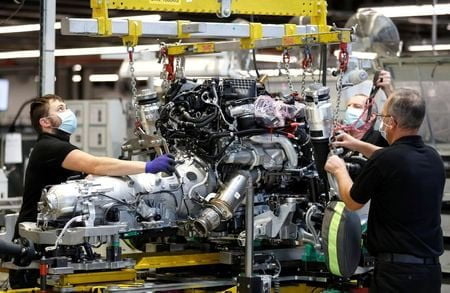LONDON (Reuters) – British factory activity grew for a fourth month in a row in September, though more slowly than in August, and the sector cut the fewest jobs since before the COVID-19 lockdown, a survey showed on Thursday.
The IHS Markit/CIPS manufacturing Purchasing Managers’ Index (PMI) came in at 54.1. That was down a touch from a preliminary reading of 54.3 and below August’s two-and-a-half-year high of 55.2, but well above the 50.0 threshold denoting growth.
“Output and new orders increased as new work intakes improved from both domestic and overseas markets,” IHS Markit said, pointing to more companies reopening after the lockdown and staff returning to work from temporary layoffs.
Britain’s economy is recovering from its COVID-19 lockdown more quickly than predicted by the Bank of England and other forecasters, although it probably remains as much as 10% smaller than before the pandemic, BoE Governor Andrew Bailey has said.
The pace of the bounce-back is expected to slow in the coming months as the government scales back its job subsidies and seeks to clamp down on rising COVID-19 cases.
But Thursday’s PMI survey for the manufacturing sector – which accounts for about 10% of Britain’s economy – showed little sign of a slowdown in September.
The steepest increase in output was in intermediate goods, typically a sign that companies are investing in more equipment, and confidence was close to July’s 28-month high.
“However, there were also increased numbers of firms noting uncertainty about the path ahead, particularly regarding COVID-19 and Brexit,” Markit said.
Jobs were lost for the eighth month in a row but at the slowest pace since February.
As demand picked up and raw materials became more expensive, the cost of inputs rose at the fastest pace in 21 months, leading manufacturers to raise their selling prices again.
Leave a comment

